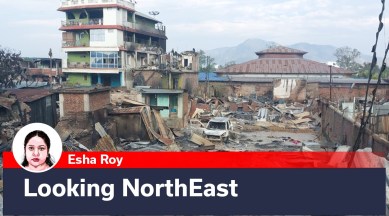Why violence in Manipur a dangerous precedent, and Centre needs to act now
A direct battle between insurgent groups and security forces has not been seen in the Northeast, across any of its states, for decades

The events that unfolded in Manipur over the weekend have been more than worrying. On Sunday, both Kuki-Zomi as well as Meitei villages were burnt down and a battle raged between Manipuri commandos and Kuki-Zomi insurgent groups, according to Manipur Chief Minister N Biren Singh.
In a statement to the media on Sunday, the CM claimed that 40 insurgents were killed and several others were captured in operations and encounters across the foothills of the Imphal Valley, where the Kuki-Zomi and Meitei groups converge.
The violence sets a dangerous precedent, pushing back peace talks and negotiations for a settlement by decades. While the Kuki National Organisations (KNO), an umbrella body of many of the Kuki insurgent groups in this area, have made it clear they want to continue peace talks with the Centre, the nature and complexion of these talks may change. The involvement of these insurgent groups in any form of violence, which the Biren-led Manipur government has been claiming, puts the groups on the back foot at the negotiating table.
Since the ethnic violence began on May 3, the leaders of these groups are believed to have left Manipur and camps designated by the Union government for these groups’ cadre have now emptied out over fear of possible ambushes by state forces.
The SoO agreement protects the insurgent groups from action by Indian or state security forces in exchange for a halt to the insurgency. In March, the Biren Singh government unilaterally withdrew from the agreement, a move that did not garner traction with the Centre. Singh has consistently accused the groups of backing poppy cultivation and providing shelter and protection to Myanmarese refugees who entered the district Churachandpur fearing persecution in their home country by the military junta.
The groups have pointed out that the Manipur government’s persistent attack on the Kuki-Zomi people and the Kuki-Zomi insurgent groups have a design that revolves around unlocking protected tribal land. This design, they say, is blocked by only one force — the armed SoO groups. And this is the fulcrum on which the recent conflict in the state has rested, they claim.
A direct battle between insurgent groups and security forces has not been seen in the Northeast, across any of its states, for decades. A two-fold exodus has already occurred — the Meiteis driven out by the Kuki-Zomi community on the edges of the Imphal Valley and Kuki-Zomis by the Meiteis in Imphal. Meiteis living in villages adjacent to Kuki-Zomi land have fled to the Imphal Valley and the exodus was completed with the Kuki-Zomi tribes, leaving the Valley to head for the Kuki-dominated Churachandpur district as well as to Guwahati, New Delhi, and other cities in the country.
Despite the devastation in Manipur this month, these are the early stages of a situation that could worsen unless the Centre takes quick, decisive and effective action, and the law-and-order situation is re-established.
If the insurgent groups engage with state or central forces, it would only work to the detriment of the tribals’ cause. The tribal groups need to be cautious not to get drawn into any stand-off and desist from retaliating in any way.
The breakdown of law and order in Manipur also raises concerns about the possibility of fringe elements becoming active. Smugglers, including those who transport drugs, are active in this region, which shares a porous international border with Myanmar.
Before Sunday’s violence broke out, a curious incident unfolded in Imphal city. A local Meitei resident accompanied three personnel from the Rapid Action Force (RAF) to a tribal-dominated area in the heart of the capital and they set a beef shop on fire. The shop was run by a Manipuri Muslim who had rented it from a tribal resident of the area. The RAF personnel — two of whom are from Haryana and one from Uttar Pradesh — have since been suspended pending investigation.
But while the Manipur police have said the three were inebriated and there was no other intention, the event has deepened the feeling of mistrust among the non-Meitei people still in Imphal city.